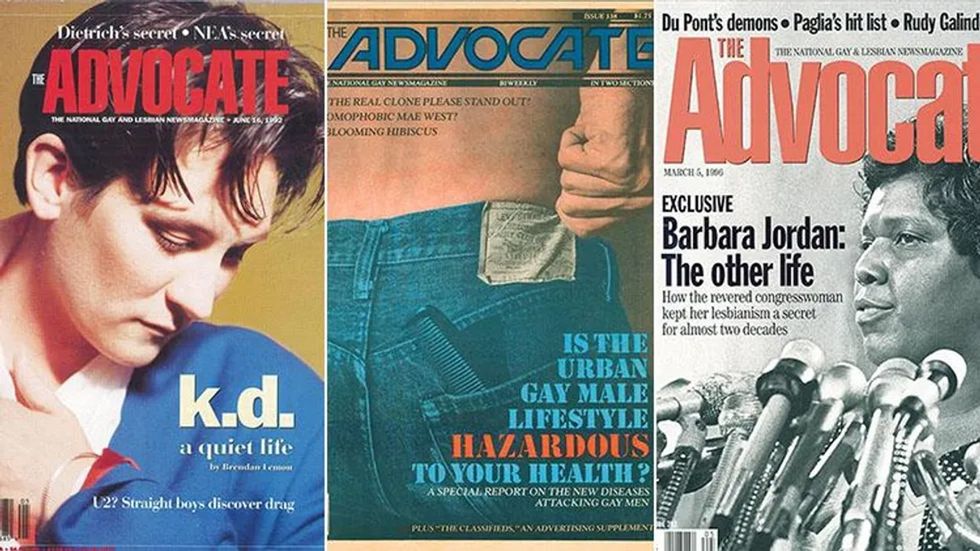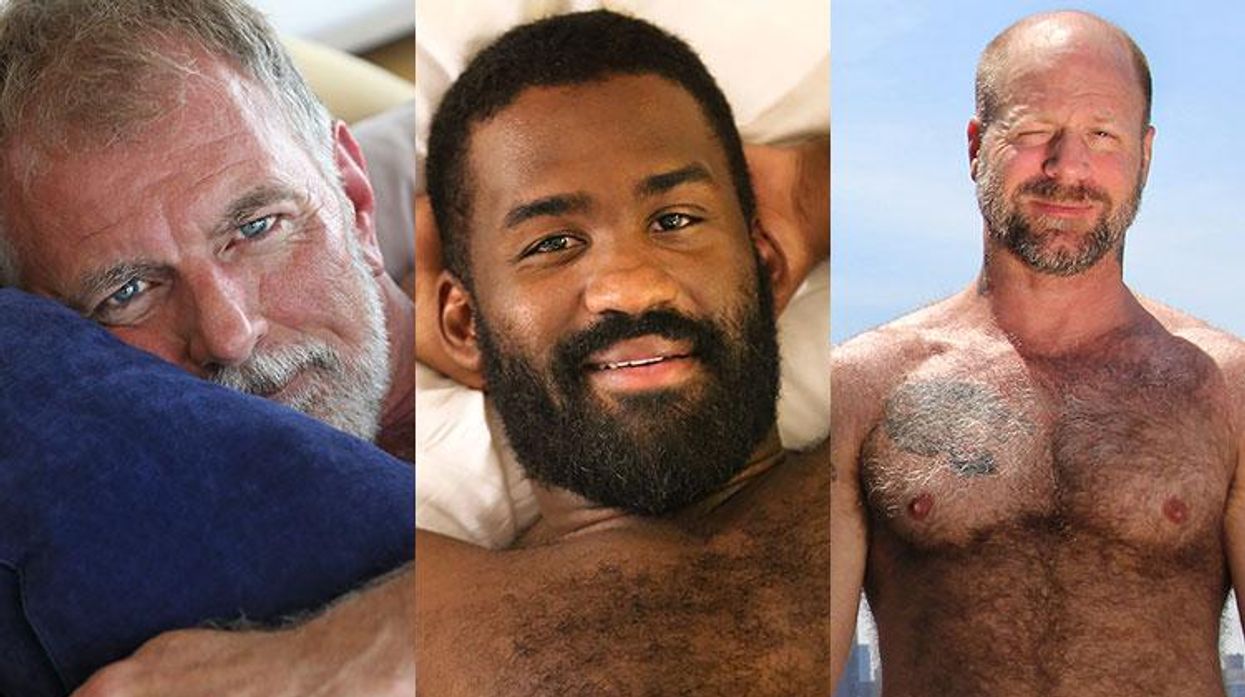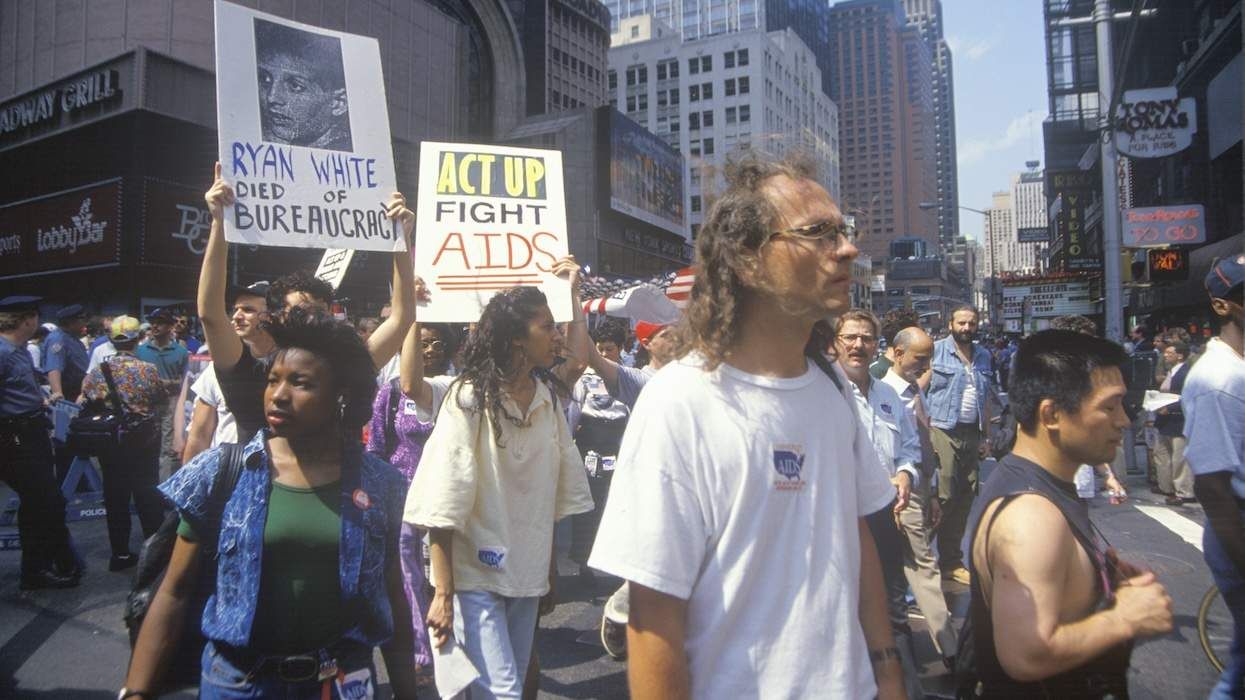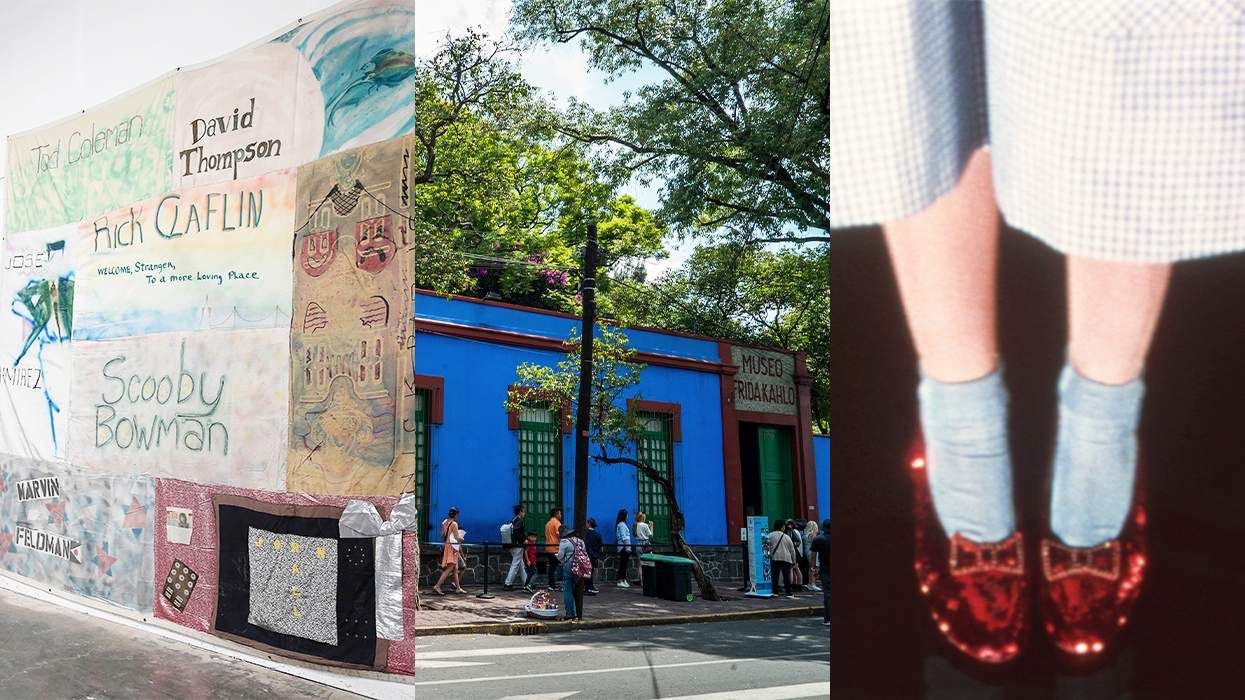Since 1967
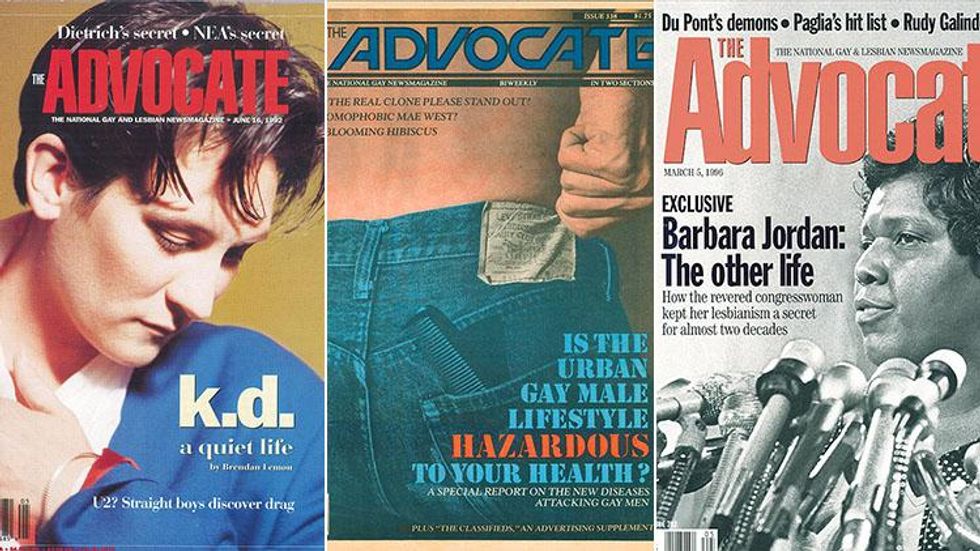
As the oldest LGBTQ+ publication in the United States, The Advocate has had a front-row view of the cultural shifts that have shaped our community -- from Stonewall and the AIDS crisis to marriage equality and the ongoing challenges facing transgender and nonbinary people.
In a retrospective of the magazine celebrating its 50th anniversary in 2017, we noted that "ever since the first issue of The Advocate clandestinely rolled off the presses in 1967, the content of the magazine has engendered debate, adulation, and occasionally venom."
Here's a look back at some of the magazine's covers over the decades.
Support The Advocate's award-winning journalism by becoming a member; for $19.67 a month, get a free print subscription along with other exclusive perks!
Vol. 1 No. 1

The Advocate launched in September 1967. It was first published as a local newsletter by the activist group Personal Rights in Defense and Education (PRIDE) in Los Angeles, in response to a police raid on the Black Cat Tavern on January 1, 1967.
Front page topics included a meeting between L.A.'s "homophile organizations" and the Los Angeles Police Department, a national conference of such organizations in Washington, D.C., and a federal court ruling on the publication of male nudity.
Alongside its coverage of political issues, the early editions of The Advocate focused largely on gay cruising culture and erotic photography.
Enter Harvey Milk

The Advocate covered the rise of San Francisco politician Harvey Milk in January 1978, after he was elected city supervisor and became the first out gay man to be elected to public office in California.
Murder & Mourning in San Francisco

On November 27, 1978, less than a year after taking office, Harvey Milk was assassinated along with Mayor George Moscone by Dan White, a disgruntled former city supervisor.
The Advocate's January 1979 issue covered the tragedy and included his obituary, which you can read here.
Is the Urban Gay Male Lifestyle Hazardous to Your Health?

The March 1982 issue focused on a mysterious illness affecting the gay community, known as GRID (gay-related immunodeficiency) at the time.
A questionnaire from the Centers for Disease Control found that many of the infected were promiscuous and some were drug users, raising fears of the "urban gay male lifestyle."
Coping With a Crisis

February 1983 marked the first time The Advocate directly mentioned AIDS on the cover.
In the article, writers Larry Bush and Nathan Fain asked scientists, doctors, and politicians what they were doing to halt the seemingly unstoppable progression of the disease.
You can see more of The Advocate's covers about the AIDS crisis here.
The Joy of Gay Spirituality

The April 1985 cover of The Advocate featured gay clergymen Troy Perry and Malcolm Boyd, who pushed for religion that welcomed a joyous celebration of gay and lesbian culture.
"The most important thing is that gay people not let organized religion steal their spirituality away from them," Perry said.
Gentlemen's Agreement

This July 1988 issue of The Advocate covered gay marriage, from the ceremony and honeymoon to the realities of domestic partnership, long before same-sex marriage was legally recognized and accepted the way it is today.
Madonna - The X-Rated Interview

Pop icon Madonna made waves with this scandalous cover for our May 1991 issue, with an interview covering masturbation, sex toys, her love life with Warren Beatty, and a lot more.
Asked why the music industry is so homophobic, Madonna replied, "They're not going to be when I get finished with them."
Read the full interview here.
Gloria Steinem vs. Sally Quinn

In the May 19, 1992 issue, legendary feminist Gloria Steinem took syndicated columnist Sally Quinn to task for saying that the women's movement, in being inclusive of lesbians, is out of touch with the majority of women. "Quinn has disqualified herself from any serious consideration as a commentator about women's issues," Steinem said.
k.d. - a quiet life
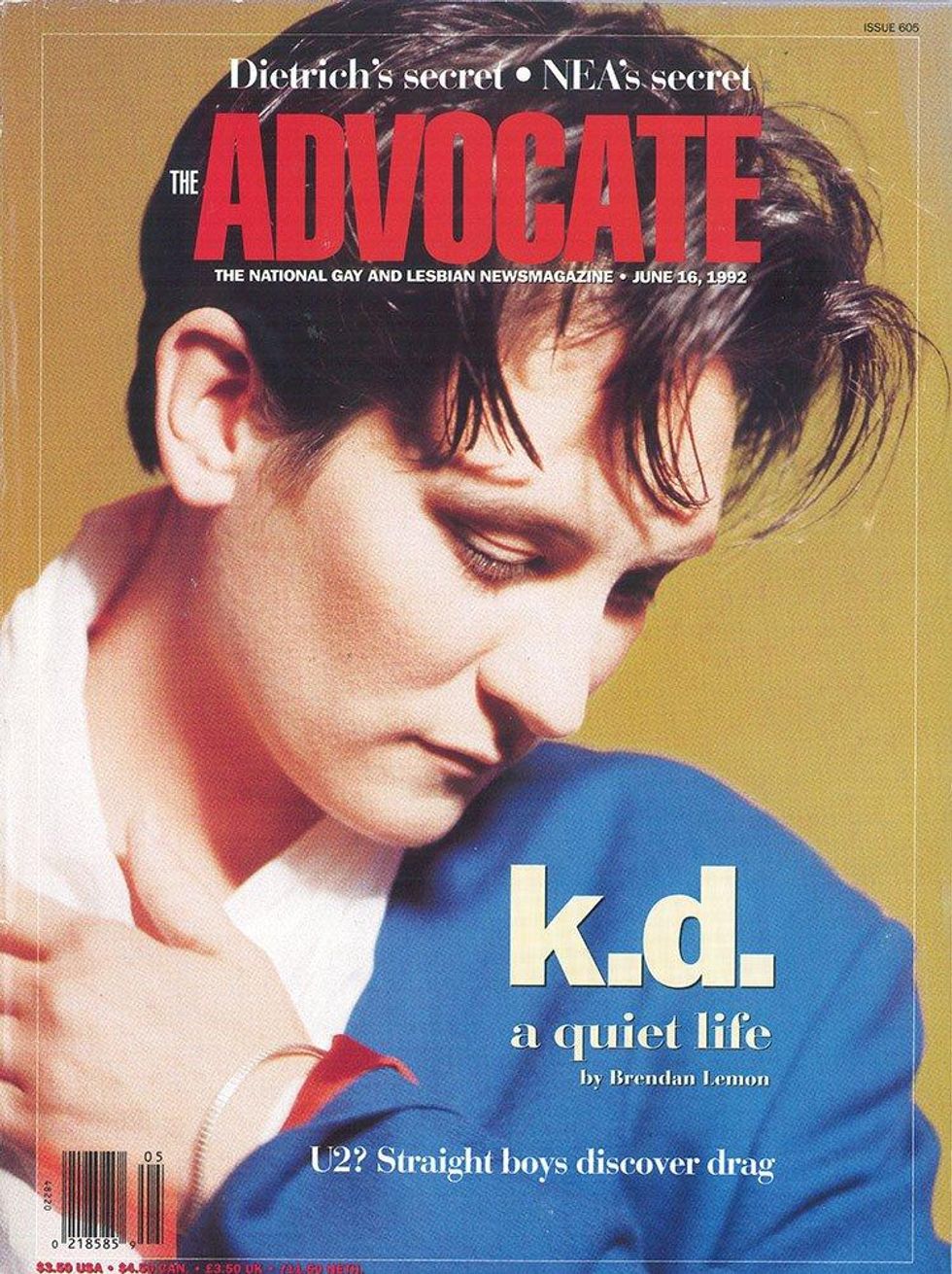
Canadian musician k.d. lang came out on the cover of The Advocate in June 1992, a year before she appeared on the cover of Vanity Fair with supermodel Cindy Crawford. While this was a groundbreaking moment for the music industry and she'd go on to become a fierce advocate for LGBTQ+ rights, at the time lang said she wasn't ready to be called an activist simply for loving other women.
"I don't feel political about my preference. I just don't. I'm sorry to disappoint you hard-cores, but I don't! I think as a human being we all feel discrimination at some time, we all feel oppression. There should be strong examples in the subculture, and I think there should be people fighting for our rights. But I don't feel like it's my passion. I feel like it's a part of my life, my sexuality, but it's not -- it certainly isn't my cause. But also I have never denied it. I don't try to hide it like some people in the industry do."
Why Bush Hates You

Our October 1992 cover story delved into how George H.W. Bush opened the door to the religious right's takeover of the Republican Party.
The Dark Side of Nirvana's Kurt Cobain

The Nirvana singer was the subject of the February 1993 cover story for The Advocate, where he talked about his support for the LGBTQ+ community and his own sexual identity.
"I mean, I'm definitely gay in spirit, and I probably could be bisexual," he told writer Kevin Allman. "But I'm married, and I'm more attracted to Courtney [Love] than I ever have been toward a person, so there's no point in my trying to sow my oats at this point. If I wouldn't have found Courtney, I probably would have carried on with a bisexual lifestyle."
Cybersex

"Is it safe to cruise in cyberspace?" The Advocate wondered in February 1995, little suspecting that dating apps like Grindr and Scruff would become an inescapable part of modern gay culture within the next 20 years.
Barbara Jordan: The Other Life

In March 1996, The Advocate ran a controversial cover story about Barbara Jordan, the first Southern African-American woman elected to the U.S. House of Representatives.
Shortly after her death that year, the magazine published the article outing Jordan and her relationship with Nancy Earl, sparking a debate over how the media should cover the sexuality of public figures and whether queer politicians have an obligation to be out while in office.
Gay TV Guide
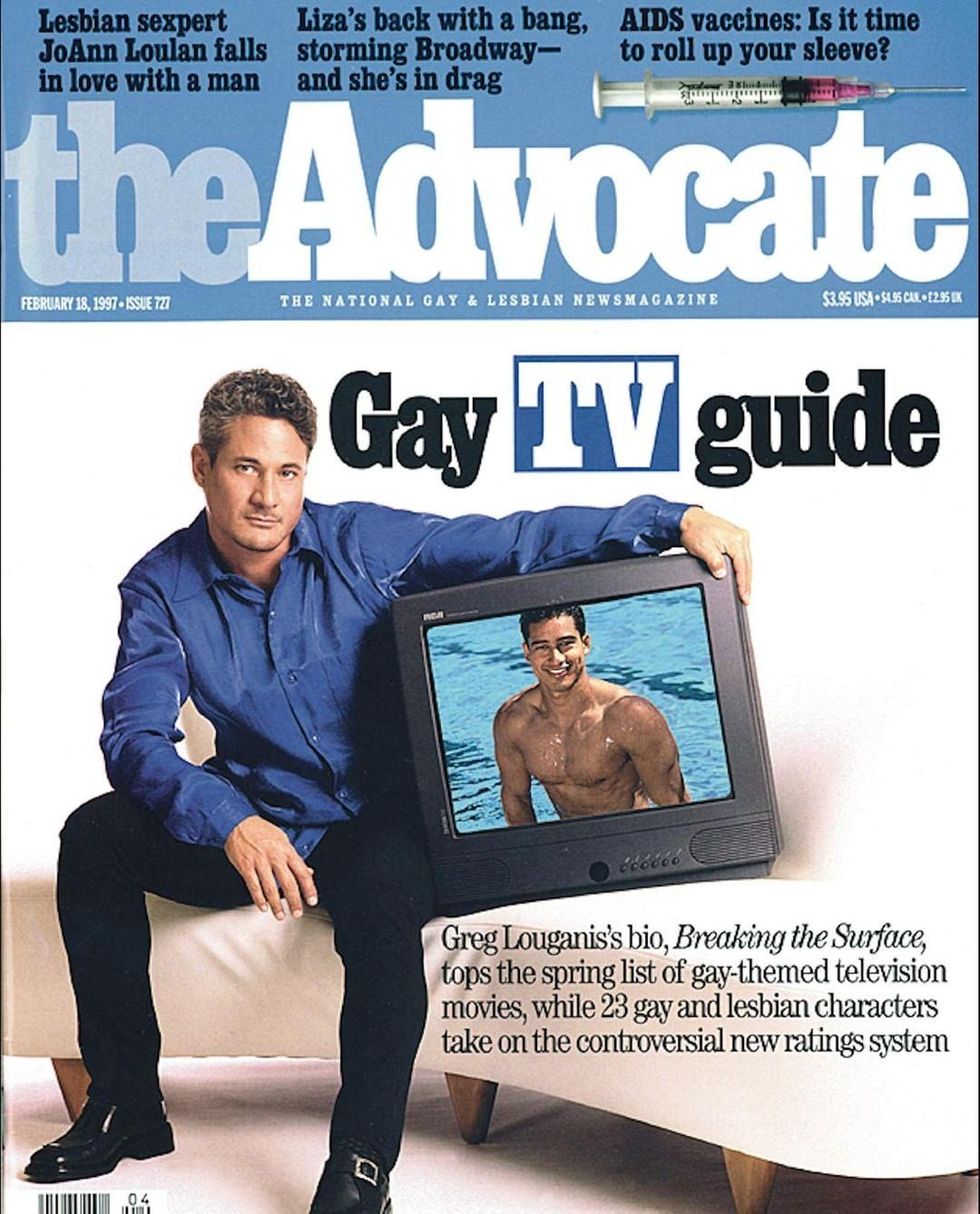
This February 1997 issue recalls a time when our gay-friendly options on TV were a lot more limited -- but did include Mario Lopez in a Speedo, playing gay Olympic diver Greg Louganis in the made-for-TV movie Breaking the Surface.
What Is Transgender?

Before there was Laverne Cox on the cover of Time, there was Alexandra Billings seated next to Greg Louganis on The Advocate's May 1999 cover, explaining to the gay community what it meant to be transgender. The language of "this woman was born a man" shows how much the public's understanding of gender has evolved since then.
Judy Wieder, who was editor in chief of The Advocate at the time, left this comment on Instagram: "We fought hard for this cover and story. Enlightenment evolves out of ignorance. You always think you're finally there. You are not."
Gay Parenting - Melissa Etheridge

Melissa Etheridge talked about parenting two children with partner Julie Cypher in the June 22, 1999 issue. At the time, their daughter, Bailey, was 2 years old, and their son, Beckett, was 6 months old.
"The whole idea of having a child has made me much more of an activist, more concerned about the world," Etheridge said. Tragically, Beckett died in 2020 at age 21.
Wilson Cruz

Actor Wilson Cruz was pushing for diversity in television long before Star Trek: Discovery, as you can see from this September 1999 cover.
Before Party of Five, Cruz was known as the first out gay actor to play a gay teen on prime-time TV, as Rickie Vasquez on My So-Called Life in 1994.
The Gay Heroes of the Terrorist Tragedy

Following the terrorist attacks of September 11, 2001, The Advocate dedicated its October 23 issue to honoring the stories of the gay and lesbian people who were lost as well as how restrictions on gay people serving in the military or donating blood were affecting the community in the aftermath.
The Brokeback Phenomenon

With gay rom-coms finally going mainstream, it's sometimes jarring to remember that in February 2006, the tragic romance of Brokeback Mountain was practically the only notable example of a same-sex relationship portrayed on the big screen.
The Advocate explored how the film gained momentum, the possibility of a sequel, and "the rush to make Hollywood's next great gay love story."
Lady Gaga

The Advocate's 2011 cover story on rising pop superstar Lady Gaga showed her close and complex relationship with the LGBTQ+ community.
"My love for my gay fans is just pure, authentic love for them as supporters of me from the beginning, and me feeling connected to their struggles as someone who is a part of their fight," she said.
The Last Warrior

Gay rights activist Larry Kramer published his novel The American People: Volume I in April 2015, and was The Advocate's cover feature for the April/May issue. Famed author Andrew Holleran sat down with Kramer for an interview that was as fiery and controversial as you'd expect.
"I'm quite disappointed in where we are," Kramer said. "I mean, it's lovely that we can get married, but that's really small potatoes compared with what we don't have, which is equality."
Read the full interview here.
Black Pride

This issue from June/July 2016 explained the importance of Black Pride celebrations, acknowledging that the public face of the LGBTQ+ community is overwhelmingly white and that many queer people of color can feel uncomfortable at mainstream Pride events.
"Black Prides strengthen our collective power by providing a culturally specific celebration for communities that live at the intersections of racism, homophobia, transphobia, and/or sexism," said Gabby Santos, coordinator of Albany's Black and Latino Gay Pride.
Read the cover feature here.
Orlando Strong

The Pulse nightclub mass shooting of June 12, 2016 was one of the darkest days in LGBTQ+ history, claiming the lives of 49 people. The tragedy reignited the gun control debate and underlined the xenophobic rhetoric pushed by the far right and embraced by Donald Trump's campaign for president.
The Advocate dedicated its People of the Year issue for December 2016/January 2017 to those who died and the survivors who pulled together to share their stories.
Read the feature here.
Black Lives Matter

Following the death of George Floyd at the hands of police in Minneapolis on May 25, 2020, the Black Lives Matter movement gave rise to nationwide protests against racism and police brutality.
This served as a painful reminder that Pride Month and the modern LGBTQ+ rights movement began as a response to police raids, and that queer people of color, particularly in the transgender community, are still facing widespread discrimination and violence.
For our July/August 2020 issue, The Advocate held a roundtable discussion with Black Lives Matter cofounder Patrisse Cullors and LGBTQ+ activists Ashlee Marie Preston, Aaryn Lang, Alphonso David, Rashad Robinson, and Alicia Garza. Read the feature here.
